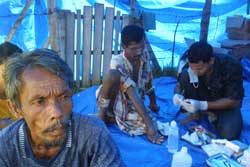Improving mental health care in Indonesia
April 2010 | Volume 9, Issue 2
Dr. Irmansyah, Director of Mental Health, Indonesia
A proponent of human rights for the mentally ill, former Fogarty trainee Dr. Irmansyah was recently appointed Indonesia's director of mental health. Irmansyah is not afraid to say that - as in many developing countries - psychiatry is a neglected branch of medicine in Indonesia. He shared his views publicly in a recent article he authored for The International Journal of Mental Health Systems.

Photo courtesy of Dr. Irmansyah
Former Fogarty trainee Dr. Irmansyah
(on left) confers with the director of the
Jakarta state mental hospital and her
staff. Dr. Irmansyah studied genetics,
disaster relief and advanced mental health
services and systems during a year-long
fellowship at Harvard University.
His particular interest in community mental health services developed during a research project early in his career. "I went to a rural area looking for patients with schizophrenia. Some had been restrained for years. That was not every schizophrenic's fate, but it wasn't unusual," says Irmansyah. "I also interviewed people who had struggled to take care of a family member with schizophrenia. What encouraged me were families that wanted to let the patient get services, and learn how to take care of them better."
In his new role as mental health director in the fourth most populated nation in the world, where mental illness is highly stigmatized, Irmansyah faces daunting challenges. Indonesia has less than 500 psychiatrists to serve 230 million people, and there are minimal community services.
Although part of his agenda includes strengthening laws to protect individuals with mental disabilities, Irmansyah's mission is increasing awareness and building up the country's mental health services.
The health ministry plans to create a new department, the Center for Mental Health. This office will have increased authority, elevating the status of mental health in Indonesia, as well as Irmansyah's position and ability to affect policy.

Photo by Saichu Anwar,
courtesy of Photoshare
As Indonesia's new director of mental health,
Dr. Irmansyah advocates for the mentally ill
in a country with minimal community services
and less than 500 psychiatrists for a
population of 230 million.
He recently spent a year on a Fogarty-funded fellowship at Harvard University studying genetic research methods. "The Fogarty program was great for my career," says Irmansyah. "I learned about advanced mental health services and systems. With the flexibility to create one's own program, I took courses in anthropology and disaster relief. It also helped me communicate better, for articles and public speaking and advocacy."
The fellowship included support for a research project. Irmansyah led a team that studied the genetics of siblings with schizophrenia. The researchers developed family-based interventions and supported a nascent Indonesian Mental Health Association for people with mental illness and their families.
When Irmansyah returned to the University of Indonesia in Jakarta after his fellowship, he was elected chair of the psychiatry department. That position, as well as his work in disaster relief in Aceh after the 2004 tsunami, brought him to the attention of the Ministry of Health.
His Harvard mentor, Dr. Byron Good, says Irmansyah has a deep commitment to building a community-based mental health system able to provide evidence-based psychiatric care. "His appreciation for both basic science and implementation research, his strategic vision and his desire to give a voice to Indonesians suffering from mental illness and their families, makes him a wonderful selection to serve as director of mental health. The Fogarty International Center can be proud of the role it played in his evolution as a leader in Indonesian psychiatry."
More Information
Human rights of persons with mental illness in Indonesia: more than legislation is needed. Irmansyah I, Prasetyo YA, Minas H. International Journal of Mental Health Systems 19 June 2009, 3:14.
To view Adobe PDF files,
download current, free accessible plug-ins from Adobe's website.